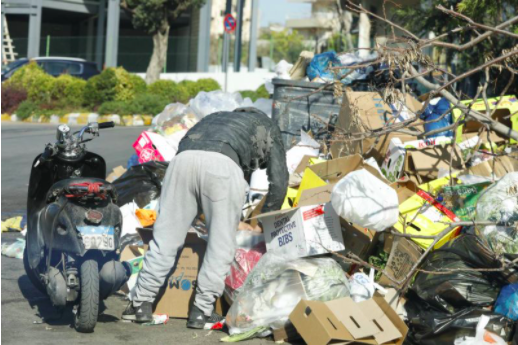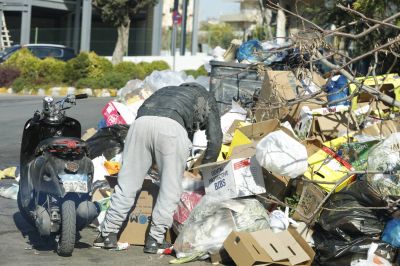
A man rummaging through garbage somewhere in Mount Lebanon. (Credit: Marc Fayad)
On a street in Beirut, in broad daylight, a man in his sixties, well dressed but barely able to stand on his feet, is rummaging through a large municipal garbage dumpster with his walking stick. A motorist stops and offers him a few lira, he accepts with a smile.
Everything in this scene tells the story of the descent into hell of a man who, not so long ago, was supposed to be middle class, and who now finds himself rummaging through garbage to survive in Lebanon, a country in crisis. There are many like him, throughout the country, whose fortunes continue to fall, and who must now depend on other people's garbage to survive.
All these people have come to swell the ranks of the destitute who recover everything that can still be sold at the bottom of trash bins. The newcomers in this parallel world prefer to operate in the dark or far from their neighborhood, out of sight, and it is indeed necessary to wait until the nighttime to find Khaled in the streets of Choueifat. Only his yellow waxed overcoat and the flashlight hanging on his forehead betray his presence near the garbage cans. He drags a sort of cart to carry the objects gleaned from the dumpsters.
Khaled is 44 years old and has two children. He is the perfect example of a man belonging to a social class of limited means, which the successive economic, monetary and health crises have pushed into abject poverty, much like nearly 78 percent of the Lebanese population according to UN figures. His basic income was very precarious and was made from the sale of fresh fish on the street. His livelihood depended on his old car and, since he can no longer repair it, he has been reduced to rummaging through the garbage for recyclable and resellable goods. An activity that would be interesting from an ecological point of view if it was not practiced without any organization or respect of security norms by untrained people, and who resort to it in pure desperation.
“What a life," he sighed, his muscles aching from hours of nightly labor. In spite of the darkness, the fatigue can be seen on his face. His body is emaciated, exhausted by endless hours of work, like a mummy creeping through the night. "I don't want to beg, I still prefer to rummage in the garbage, I sometimes find old clothes, sometimes cans, or plastic, so many materials to be resold to recyclers, per kilo." This man, who is now starving, is an invisible and silent witness to the excesses of the distribution of aid by NGOs to the country’s poorest, and hoarding of goods in homes: he often finds in the dumpsters bags of expired rice and spoiled products. "Is it greed or panic? I don't know, but it hurts my heart," he said.
Khaled doesn't shy away from odd jobs during the day, when he can find them, at the expense of his health. The only help he gets from time to time is from the municipality of his city. But none of this can allow him to feed his children, and he leaves his house in the cold of the night, never before one o'clock in the morning, to look for food without being recognized. He has succeeded in making himself invisible: when asked, the overwhelming majority of the inhabitants of the neighborhood said they have never seen him near the garbage cans, do not know him or do not know anything about his nocturnal activity when they see him during the day. And this has been going on for at least eight months.
"I try to survive, but despite all the fatigue, this extra income is far from enough to keep my family safe from hunger," he said in the darkness. And if food is becoming a luxury, what about schooling for his children?
"They are enrolled in the government school, but I can't always afford to take them there because of the high cost of gas and transportation," he says.
Of his former life, however modest, Khaled has only vague memories. "Before, we used to help the poor, now everyone is poor, who can help whom nowadays?”
With his child
In the busy street of Hamra, Samer is also rummaging through the garbage in search of anything that will keep his family safe from want. This 36-year-old father is continually accompanied by his 12-year-old son, who has learned to help him in his work. "I have to keep my son with me because my wife works to help me, she does housework," he explained. This does not prevent him from being very aware of the repercussions of this life on his offspring. "My son should have been at a school desk by now, instead he helps me pick up trash," he sighed.
For two years, Samer has been going through the streets to search for garbage. He used to have a job, working in a plastics factory, but an accident at work put an end to that life. "I've been limping slightly since then," he said. Left behind by a ruthless system, too proud to accept help from anyone, he finds himself on the street. "We work to feed ourselves, that's all, we can't afford anything else," said the man, who lives in a tiny apartment with his wife and son in Bourj Hammoud.
While talking, the man works to isolate the cans from other waste. He prefers to collect only aluminum, more lucrative than other recyclable materials. To do his job without attracting curious looks, he has a different strategy than Khaled: instead of staying in his neighborhood and waiting for darkness to come, he has made himself invisible by never staying put. "Some people are very territorial, my son and I travel all over the country," he said.
This article was originally published in French in L'Orient-Le Jour.
